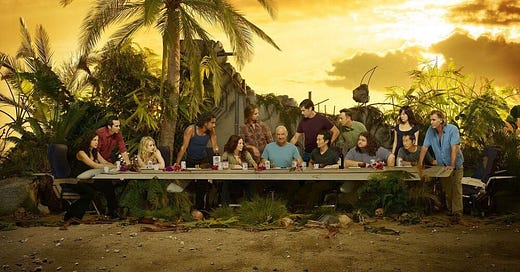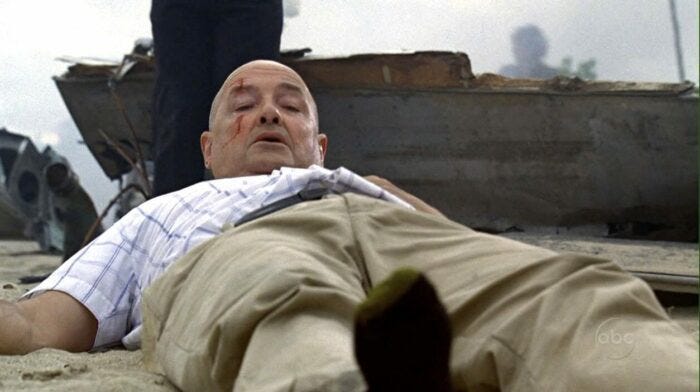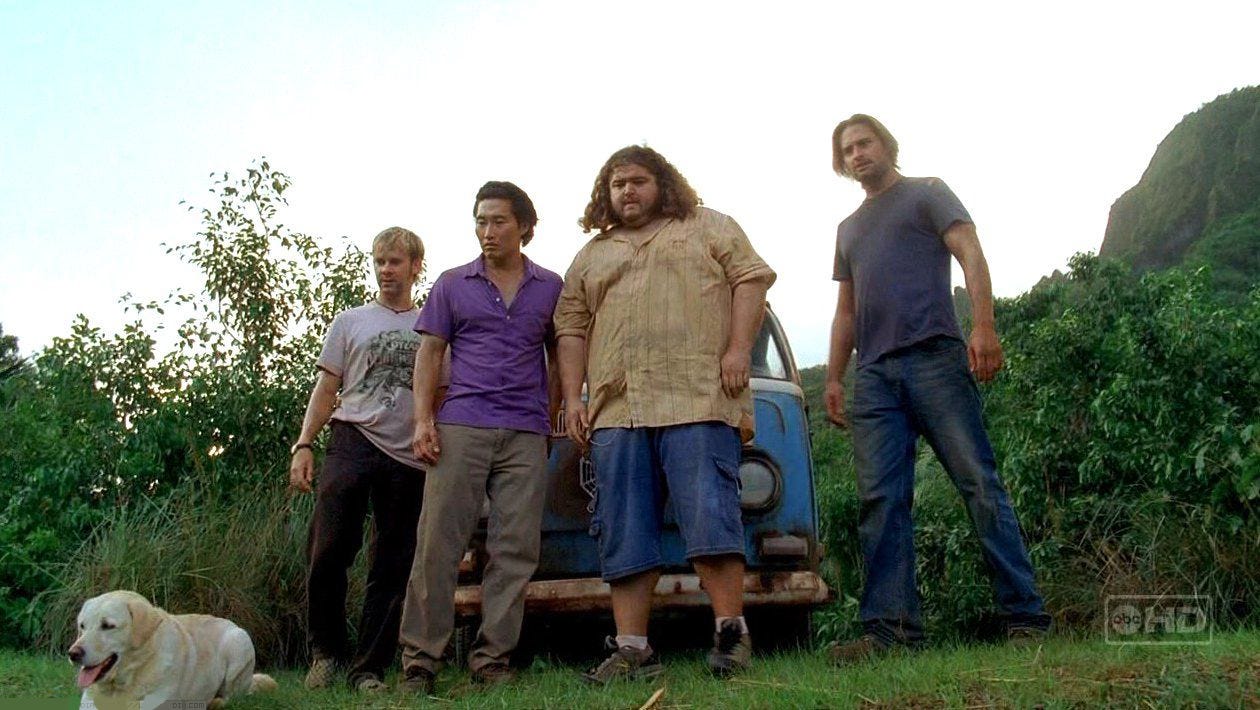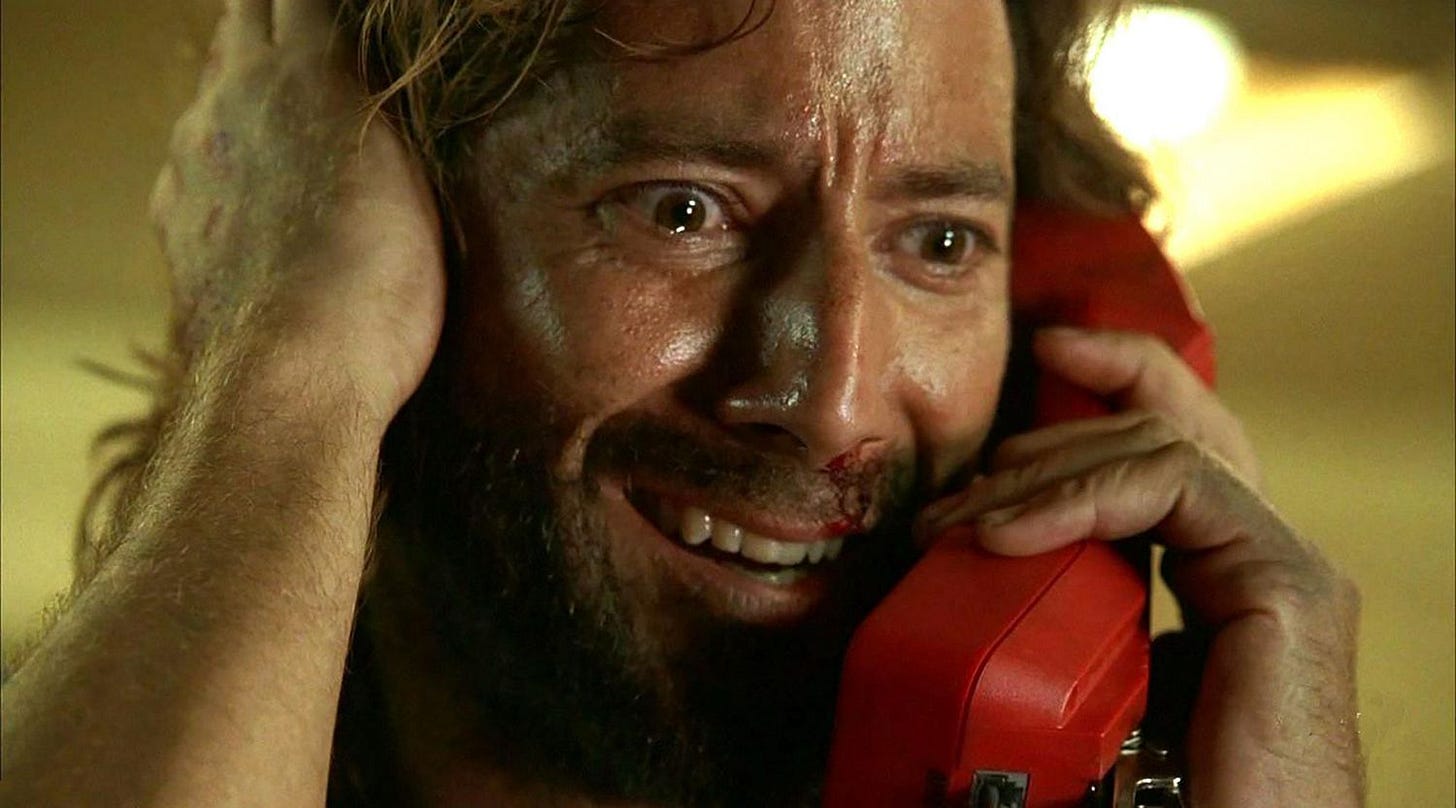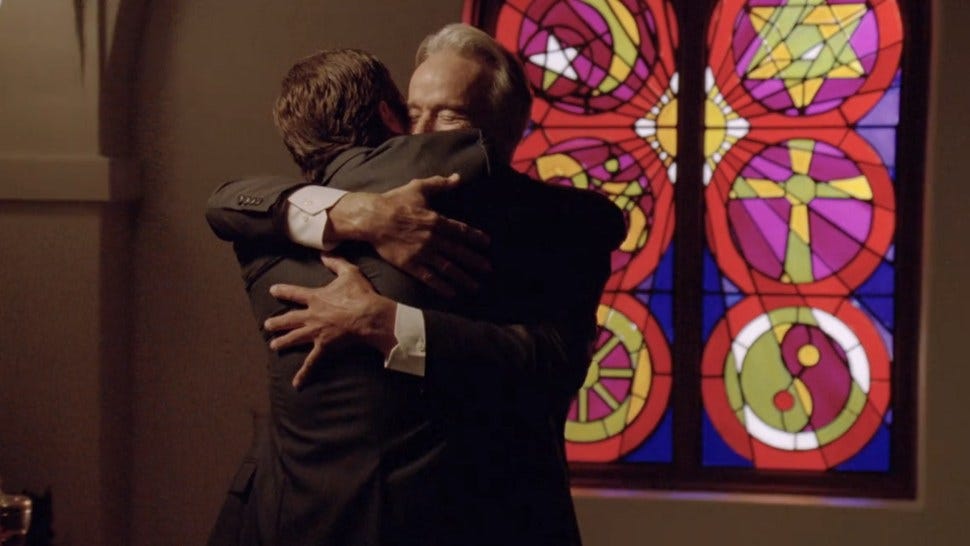Lost is back on Netflix (just in time for its 20th anniversary in September), and I wrote about it for the National Catholic Reporter. Obviously I would really appreciate it if you checked out the article, but in short: Lost was incredibly important in my spiritual formation and I believe it still has a lot to tell us about faith and community.
While many remember Lost for the mysteries it did or didn’t answer, my favorite moments were always when the show got explicitly or implicitly spiritual. So as a sort of companion piece to the article, I wanted to share eight1 episodes that, to me, embody those spiritual themes. It’s by no means a “Best Of” list and it certainly isn’t a “If You Want to Understand Lost, Just Watch These Episodes!” list. These are moments that I found moving and enriching as a young adult figuring out his relationship with God, and they still resonate with me today. I offer them as a celebration of the series and, maybe, an endorsement for why you should watch if you haven’t.
That being said, some spoilers are unavoidable (though I’ll try my best).
“Walkabout” (Season 1, Episode 4)
John Locke2 (Terry O’Quinn) was the spiritual heart of Lost. A survival expert, he adapts to marooned life much more quickly than the other erstwhile passengers of Oceanic Flight 815, and plays a major role in helping them stay alive. He also forges a mystical connection with the Island, becoming attuned to its rhythms and peculiarities, and becoming convinced that the survivors are there for a greater purpose. In “Walkabout,” we get our first flashbacks to Locke’s pre-crash life, and it’s nothing like we expect. The competent, unflappable adventurer of the Island is a frustrated man, belittled by coworkers at his dead-end corporate job and using a phone sex line for intimacy. He’s spiritually-famished, convinced that there must be a greater meaning to life that continues to elude him. This episode reveals Locke as Lost’s Job figure (one of them, anyway): the man of faith whose credulity is most often rewarded with humiliation or violence. But it also reveals the root of his faith in the Island, which will drive him through the rest of the series: a real, honest-to-God miracle.
I could write quite a bit about how Locke’s arc interacted with my own faith journey — then and now — but I’ve got seven more of these to write about. Maybe when the 30th anniversary rolls around.
“Orientation” (Season 2, Episode 3)
Another Locke episode! For reasons I won’t get into, Season 2 finds the survivors dealing with a mysterious bunker in the jungle. Inside is a computer, which needs to be fed a code every 108 minutes. If it isn’t? Well, the guy who they found inside says the world will end, but who knows? Locke and Jack (Matthew Fox) — a doctor, the group’s leader, and the “man of science” to Locke’s “man of faith” — immediately clash over what to do about it. Locke, of course, is completely credulous, Jack skeptical. With the clock ticking down, they have to make a decision and Locke has to make his case for faith. As you can see in the clip above, what finally gets through to Jack is the idea of having faith in others, even if you can’t go further than that — which is Lost in a nutshell, really (also, it’ll spoil the end of that episode, but whatever).
“The 23rd Psalm” (Season 2, Episode 10)
Aside from having a lot of thematic material that Catholics would vibe with, Lost also featured actual Catholics, notably former rocker Charlie (Dominic Monaghan) and Mr. Eko (Adewale Akinnuoye-Agbaje), who is the center of this episode. The flashbacks focus on Eko’s past as a Nigerian criminal and his tense relationship with his younger brother Yemi (Adetokumboh McCormack), a Catholic priest. In this episode, Eko pressgangs Charlie into accompanying him on a quest into the jungle, looking for a sort of redemption. At the end, Eko and Charlie recite Psalm 23 (“The Lord is my shepherd, I shall not want…”), while we see scenes of connection back at the beach camp. For me, this sequence is the most powerful evocation of Lost’s belief that we find grace through each other and our mutual brokenness. It was also the first episode of Lost that I watched on my own (after bingeing everything up to that point at a friend’s house over a single weekend, Christmas break my sophomore year of college), which felt like getting a thumb’s up from God. I went on a retreat the next week and started saying Psalm 23 at night; I still pray it almost every night.
“Tricia Tanaka is Dead” (Season 3, Episode 10)
This episode often gets cited as one of the best episodes of the series and that’s because it’s a certified banger, to use a technical term. It revolves around Hurley (Jorge Garcia), my favorite character on the show, who is less spiritual than deeply superstitious. Convinced that he’s cursed (as explained in the Season 1 episode “Numbers,” which could be on a longer version of this list), this episode sees Hurley find the courage to spit in the eye of fate — a huge turning point for the character. As always, it happens because of the bonds he’s forged with others on the Island. There’s also a great needle drop of Three Dog Night’s “Shambala,” which I’ve used as a retreat song a couple of times.
“Catch-22” (Season 3, Episode 17)
Maybe the show’s second most-Catholic episode (following “The 23rd Psalm”), this one gives us flashbacks to Desmond’s (Henry Ian Cusick) stint in a Catholic monastery, where he picked up his penchant for calling everyone “brotha.” In the on-Island story, Desmond faces a terrible test of faith, linked with the story of the sacrifice of Isaac; the episode is largely about the terrible burden of answering a higher call as a fallible being. But it’s also about Desmond’s vocational crisis: he enters the monastery not because of a call from God, but as a way of running away from the life he led before (not the first or last time he’ll do this). But much like St. Ignatius of Loyola getting kicked out of the Holy Land, in the end he discovers that perhaps this misfire was a step on the path to where he’s actually meant to be.
“The Constant” (Season 4, Episode 5)
I feel like a hack including this episode because it’s always at the top of everyone’s Best Of lists. I do love this episode, which is a great piece of sci-fi and a great example of the show’s formal boldness. But more importantly, it’s also about how love is the one thing that connects us across time and space, the one thing that can save us. It’s also, technically, a Christmas episode. How am I supposed to leave that off of the list?
“316” (Season 5, Episode 6)
While this one is mostly remembered for advancing the mythology of the show pretty significantly and tying up the Oceanic Six plotline, it also sticks with me as a critical step in Jack’s reluctant faith journey. For the first four seasons Jack stubbornly refuses to accept Locke’s premise that there’s a mystical reason that they all ended up on the Island, even as he experiences things that defy logic. It’s only once he’s separated from the Island that Jack begins to have doubts about his lack of faith, an existential ache that leads him to find a way to return. Working with the slippery Ben (Michael Emerson3), he does… but it means laying down his long-cherished skepticism. At one point, the two find themselves in a Catholic church, and Ben points out a copy of the Caravaggio painting of Thomas putting a finger in Christ’s side. “We’re all convinced sooner or later, Jack.” Jack may not be fully convinced by the end of this episode, but he’s taken his first leap of faith. That’s always the biggest one.
“The End” (Season 6, Episodes 17-18)
The series finale of Lost gets a lot of hate, primarily from viewers who felt that the point of the show was the answer every mythological question it answered, as clearly and satisfyingly as possible. While I won’t deny that I also wanted answers, I stuck with Lost because of the characters and the meditation on faith. The finale didn’t answer every question4, but it certainly resolved those two elements. For that reason I remain an ardent defender of the way the show ended: with an unabashedly spiritual grace note, affirming the importance of human connection and that faith — while difficult and often thankless — is rewarded in the end. To me, the most important question that Lost raised was “Are we here for a reason?” The finale answers with a firm yes: to love each other, to help each other, and to learn to move on together. When a series finale gives me that, you’ll forgive me for not really caring that they didn’t tell us who was in the other outrigger.5
Things Seen & Heard
While most of the retrospective on Lost is positive, I think it’s also important to share this excerpt from Maureen Ryan’s Burn It Down, which goes into what a toxic nightmare the show was behind the scenes. I somehow missed this when it originally came out in May 2023. It’s definitely not a fun read, but it raises really important points about work culture and human dignity, whether you’re making a network TV show or not.
That’s all for this week! See you in another life, brotha!
Why eight? Watch the show!
Lots of characters were named after philosophers, it all seemed very important and clever at the time.
Genuinely one of the best performances in the series and one of the best TV performances in the history of the medium.
And a lot of those answers were pretty unsatisfying! It was a bummer to see inside the Temple, etc. I generally found the questions more compelling than their resolutions, which is why I’m such a diehard for co-creator Damon Lindelof’s Lost follow-up, The Leftovers. I’m a Battlestar Galactica (2003) finale defender for the same reasons.
Don’t ask.

